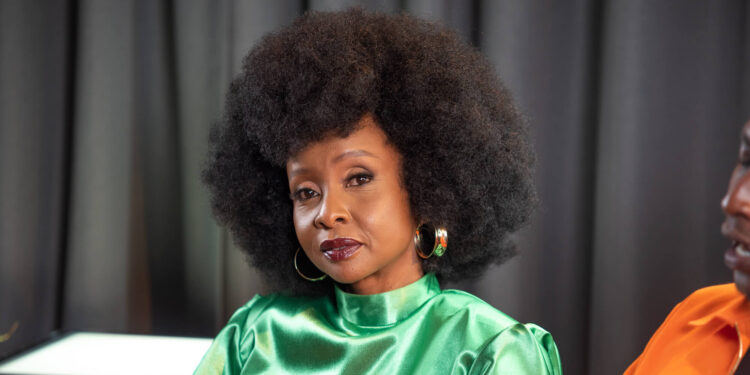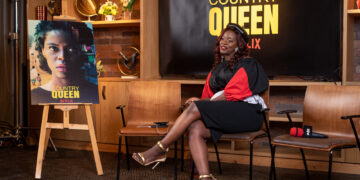With a career that spans 25 years, Nini Wacera is without a doubt a powerhouse in the film and TV industry in Kenya. She has featured in numerous award-winning and critically-acclaimed films and TV shows such as Dangerous Affair, Wingu la Moto, Epilogue, Nairobi Half Life, Kona, Desperate Housewives Africa, Rafiki, and most recently, Netflix’s first Kenyan series Country Queen.
Her consistency and tenacity for the love of the craft has kept her constantly evolving with each character she takes on. Completely immersing herself and truly understanding the nuances of characters, is what makes viewers glued to her performances. This unique approach to acting has justly given her a distinctive brand – one that without a doubt, will stand the test of time.
Breaking down a complex character to its very core and really understanding their ‘why?’ is crucial to her process. Knowing what drives them, their fears, insecurities, and passion makes up the fundamental being of each role she takes on. “What draws me to playing complex characters is the reality of life itself. Human beings are complex, and it is my work to hold a mirror to society. If you gave me a character that doesn’t reflect how society functions, they would simply not feel real to me. And in my preparation, I would make her complex”, Nini says.
In Country Queen, streaming on Netflix, Vivienne Sibala is a symbol of the vices woven into a capitalistic society where greed, manipulation and child exploitation just to mention a few, take centre stage. Portraying her is no easy fete, Nini admits. What would drive her (Vivienne Sibala) to use children in a mine? To flesh out her complexity, Nini had to imagine a backstory that wasn’t even in the script.
“Vivienne is angry with all the children who have been born, and all the children that her ex-husband did not allow to be born – all the miscarriages she had,” says Nini. “Every time she sees a child, the pain of losing her own children returns. This is not even in the script but I had to make the connection so that I can be okay with her sending kids to work in the mine. As actors, we always question intention to know where behaviour comes from. The more complex, the more believable it is since it comes from somewhere deep.”

With the immediate success of Country Queen, it goes without saying that preparation played a key role. There was a lot of training workshops for the actors and crew. “Finding writers who write complex characters like Mkamzee Mwatele, who told me about Vivienne Sibala for like two or three years even before this character existed, was exciting. I began imagining who Vivienne is and the layers I could add to her, and I was like ‘let me risk it all by adding anything to the character, so long as it pushes the story forward’. This is what I tell actors.”
Having a successful career definitely comes with its fair share of challenges. Like being a female artist in a patriarchal society that always views you as an object. Taking on characters who are empowered in their sexuality and femininity resonate with Nini who acknowledges that femininity is a power rather than a weakness that helps her to be one-step ahead and play by her rules. “Seduction is not necessarily sexual,” Nini admits. “It is more about empowering or taking control back and getting what you want by appealing to whatever weakness the other person feels. The difference between this and manipulation is that the latter is twisting to get what you want but seduction is two-sided where we both benefit.”
In Country Queen, Vivienne uses manipulation all the time, especially when dealing with her husband Max (played by Blessing Lung’aho). “Max and I have a goal and our relationship is that we always keep the eye on that goal. However, Max forgets that I am the brain and thinks we are partners, but he is just being a typical Kenyan man threatened by a woman in charge. So, Vivienne easily manipulates him every time she needs something done, because this makes Max feel like he is in control,” Nini says.
Intimate scenes where intimacy coordinators guide actors are still, to some degree, a new concept in the Kenyan film and TV industry. Directors take up the role by creating a closed set – everything technical is set up and it is just you and them. Such scenes can be a bit overwhelming, and for Nini, they can’t be gratuitous. “Intimacy is hardly ever for intimacy sake. There is always an underlying want. One character always wants something from the other and this might be a way of them getting that. Understanding the subtext within helps keep the scene true to its intent. With Country Queen, it was more about me showing Max who has more power and putting him in his place,” she says.

Before Country Queen, we hadn’t seen Nini on screen for a long time, but she doesn’t see this role as a comeback. For her, the term comeback is relative. While this usually implies that an artist stopped doing their art entirely and now has resumed back to it, with Nini, this is not the case. Despite having to quit acting back in 2015 after a terrible International job experience that had a toxic welfare system, she explored other avenues that enriched her acting prowess in more ways than she could imagine.
“I don’t think this (Country Queen) is a comeback, I never left,” she says. “What I did is, I decided there is a production quality level that I was going to go back to. This realisation came with working with the Germans in their training workshop (for Country Queen), which empowered me with the capacity to understand the intricate details of what goes behind the scenes of making a great story. I got to a whole new level of professionalism and with this knowledge; I found it difficult, going back to most of our Kenyan productions that greatly undermined the quality by cutting costs.”
This affirmation is not surprising considering 20 years ago that most, if not all productions were in the hands of producers who greatly overlooked actors and the entire production crew by paying them miserable fees. And while most actors and crew eventually quit the entire craft all together, Nini did not venture far from acting. “I never knew being a casting director can be a job description. It allowed me to work with a lot of actors and I learnt a lot while in the process of teaching them the way to go. You end up being the liaison between the actor and director and you get to see how actors interpret roles and also what directors are looking for. This new craft allowed me to work in that environment with better quality production houses, since at the time, Kenyan productions were not using casting directors.”
Aside from being a casting director and an actors coach, Nini also ventured in ecosystem-restoration where she restores damaged ecosystems by using indigenous trees and bees. “In the period where I was not acting anymore, I went to study Permaculture and Syntropic Agriculture because I wanted to understand the food systems but most importantly, the soil and water table and how it affects the survival of planted trees. With this information, I have taught kids in Kibera, done project in Ngong and taken up small projects mainly in urban areas to rehabilitate and help safeguard the soil to make it fertile. I basically build soil,” Nini says.
In her ‘hiatus’ period, Nini observed notable changes in the industry. Like increased level of respect and understanding of what the production process involves, more school training and workshops, more actors coming back from abroad, a heightened level of professionalism with actors now more aware of mental health issues, people making a career out of this and finally, more avenue to showcase films and TV shows. “A big comparison between then and now, however, is that the network was so much tighter,” she admits.” Like I remember passing by Big Idea offices to greet some friends and that is when I heard about an audition at Phoenix Theatres and landed my role in Dangerous Affair. Right now, you do not know who is casting or who is filming a series. The network is broader, making it harder.”
With close to 70 years since the filming of the very first locally produced TV series and film in Kenya, can we now classify this as a film industry? This question sparks a lot of debate amongst filmmakers. According to Nini, the Kenyan film and TV collective isn’t quite an industry yet. “We’re more of a sub-sector of the Ministry of Culture. An industry is a space that the manufacturer is able to meet the consumer demands, and if the viewers demand a certain quality of content and this does not translate, then we fail. As filmmakers, we dictate the content but not the numbers, the numbers are based on what is needed by the viewers and it’s not sub-standard content. Even the local broadcasters are not willing to explore or invest in other richer material. We also still have not tapped into the larger Kenyan audience market that is outside Nairobi, neither have we evolved based on the culture of the consumers.”
Building an industry takes proper management, structural policies and most importantly, key investments, not just from various stakeholders and donors but also from the consumers like Kenyans buy Kenya. That is how locals support an industry. However, what happens is that we depend on foreign funders to ‘build’ our industry, and they dictate the stories they want to be filmed, their stories.
Country Queen is available to stream on Netflix.











